| Shepherds of Christ Daily Writing |
 |
March 21, 2019
|
March 22nd Holy Spirit Novena |
The Novena Rosary
Mysteries |
Pray for Special Intention, all involved
Please pray for Jim, Dan, Fr. Mike, Mary.
Prayer for Grace for our Country
Dear Father united to Jesus in the Holy Sacrifice of the Mass, the Sacrifice of Calvary sacramentally made present, celebrated around the world, in the Holy Spirit. We offer up all we do united to the Mass. We unite in one mind and one heart as members of the mystical body of Christ, with Christ our head in the pure and holy Hearts of Jesus and Mary, through the powerful intercession of Mary with all the angels and saints and souls in purgatory, and we beg for the saving grace, for our country, the United States. Please help us. We further pray for unity to always do the will of God in love. We spread the Blood of Jesus on the leaders and people of the United States and cast the devil into hell. We consecrate our country to the Sacred Heart and Immaculate Heart and all our dioceses, and beg for an outpouring of the Holy Spirit. God help us. We pray for our families, the priests, the Church and the world. In the Name of Jesus please hear us, we pray. We pray for our president and leaders. We pray that we are united as one nation under God to work together in love as God wants.
March 21, 2019
R. 40 days of Lent.
Do whatever you do for God.
It is in loving we are most like Him.
Pray for 2 special intentions.
Today's Readings
Jeremiah 17: 5-10
A group of wisdom sayings
Yahweh says this,
'Accursed be anyone
who trusts in human beings,
who relies on human strength
and whose heart turns from Yahweh.
Such a person is like scrub
in the wastelands:
when good comes, it does not affect him
since he lives in the parched places
of the desert,
uninhabited, salt land.'Blessed is anyone who trusts in Yahweh,
with Yahweh to rely on.
Such a person is like a tree by the waterside
that thrusts its roots to the stream:
when the heat comes it has nothing to fear,
its foliage stays green;
untroubled in a year of drought,
it never stops bearing fruit.'The heart is more devious
than any other thing,
and is depraved;
who can pierce its secrets?
I, Yahweh, search the heart,
test the motives,
to give each person what his conduct
and his actions deserve.
Psalm 1: 1-2, 3, 4, 6How blessed is anyone who rejects the advice of the wicked
and does not take a stand in the path that sinners tread,
nor a seat in company with cynics,
but who delights in the law of Yahweh
and murmurs his law day and night.Such a one is like a tree planted near streams;
it bears fruit in season
and its leaves never wither,
and every project succeeds.
How different the wicked, how different!Just like chaff blown around by the wind
For Yahweh watches over the path of the upright,
but the path of the wicked is doomed.
Luke 16: 19-31'There was a rich man who used to dress in purple and fine linen and feast magnificently every day. And at his gate there used to lie a poor man called Lazarus, covered with sores, who longed to fill himself with what fell from the rich man's table. Even dogs came and licked his sores. Now it happened that the poor man died and was carried away by the angels into Abraham's embrace. The rich man also died and was buried.
'In his torment in Hades he looked up and saw Abraham a long way off with Lazarus in his embrace. So he cried out, "Father Abraham, pity me and send Lazarus to dip the tip of his finger in water and cool my tongue, for I am in agony in these flames." Abraham said, "My son, remember that during your life you had your fill of good things, just as Lazarus his fill of bad. Now he is being comforted here while you are in agony. But that is not all: between us and you a great gulf has been fixed, to prevent those who want to cross from our side to yours or from your side to ours."
'So he said, "Father, I beg you then to send Lazarus to my father's house, since I have five brothers, to give them warning so that they do not come to this place of torment too." Abraham said, "They have Moses and the prophets, let them listen to them." The rich man replied, "Ah no, father Abraham, but if someone comes to them from the dead, they will repent." Then Abraham said to him, "If they will not listen either to Moses or to the prophets, they will not be convinced even if someone should rise from the dead."
R. A good mother wants a child to be healthy
and live a happy life.
God created us in His image and likeness, but
we have original sin on our soul.
Baptism takes away original sin, but we
have a wounded human nature. We have
tendencies toward the deadly sins.
God is above – He wants us to reach
greater perfection in Him – He gives us
the sacrament of baptism which is
a sharing in His life.
God loves us – in Isaiah God says
"I have loved you with an everlasting love"
We can reject God's love –
I speak of the apex of creation July 13, 1997.

Excerpt from July 13, 1997 Rosary
The Agony in Garden
7.
R. And He said in the last message in the Blue Book, in the Blue Books He says exactly what to do, now I go back and I see all these things, I never knew what He was saying when He was saying them before. He has given us so much. The last message in the first Blue Book, what did He say? “Don’t question God.” Your answers are given there. So we keep questioning and we keep wanting to know, “Why this? Why that? Why that?” That’s what He’s telling us what to do in this Movement to bring about the Reign of the Sacred Heart. We have human minds. We do not comprehend things as are in the Divine Mind. It’s like asking us how a baby is conceived in the womb. Why the stars shine. Could our minds understand this? What makes a tree grow? Looking inside of an ear and seeing the intricacies in an ear. The Divine Mind created that.Jesus is giving us insight into the hidden mysteries to understand and know Him more fully. God elevates our knowing and loving capacity in baptism. God gives us a sharing in His Divine life in Baptism. God is a Divine Person. We are human persons, but God gives us a sharing in His Divine life in baptism. In the apex of creation - the dog cannot think like we think. He does not remember and think like we think. His nature is that of an animal. We have a human nature, it is much higher than the dog. But if God did not give us the grace, we could not comprehend anything about the mystery of the Trinity. When we are baptized, He elevates our knowing and loving capacity. We share in His life. We can understand things because He gives us grace. And we know on a different level. We go to the Eucharist and we get this immense amount of grace. And if He gives us even a more special grace which He is doing to us especially because we keep giving ourselves so much to Him in this consecration. He wants us to give ourselves to Him.
Grace comes from God. It’s a gift. He gives it as He chooses. He gives it most abundantly in the Eucharist, before the tabernacle, when we receive Him in Communion. So we go in there, we receive God, and He elevates our capability to know as we become more intimate with Him. This is immensely what this new era will be - knowing God with this highly elevated level. You know how you read the Scriptures for years and you didn’t get something out of a certain line and then all of a sudden, it’s just crystal clear and it like burns in your heart, because at that point, God gave the grace and the vision and the insight into the mystery of that line of Scripture. Can you see Jesus in the garden, knowing everything, knowing the love of the Trinity, knowing everything about every mystery into God, and knowing He is going to go out there and they are going to hang the Almighty God on a tree, mock Him, spit on Him, whip Him, pound nails into His hands and thorns into His head, and hang Him to die on a tree.
end of excerpt
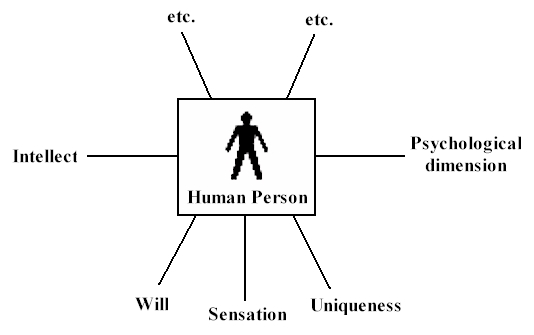
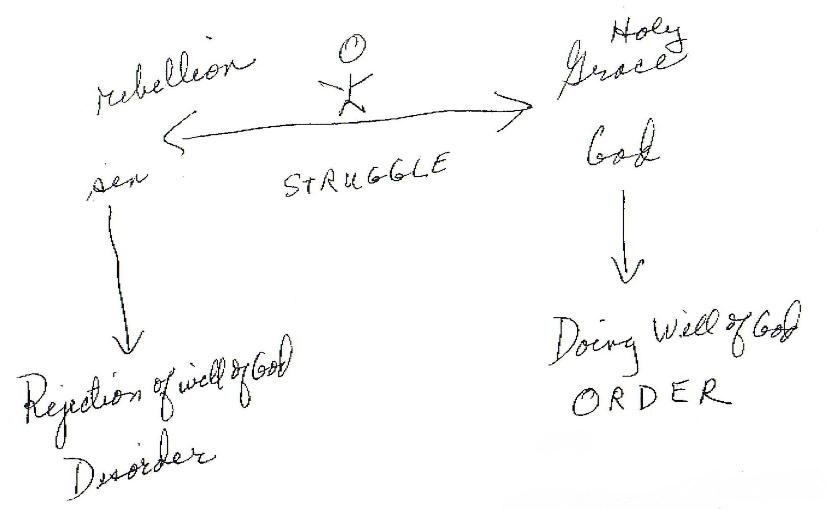
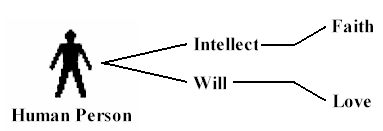
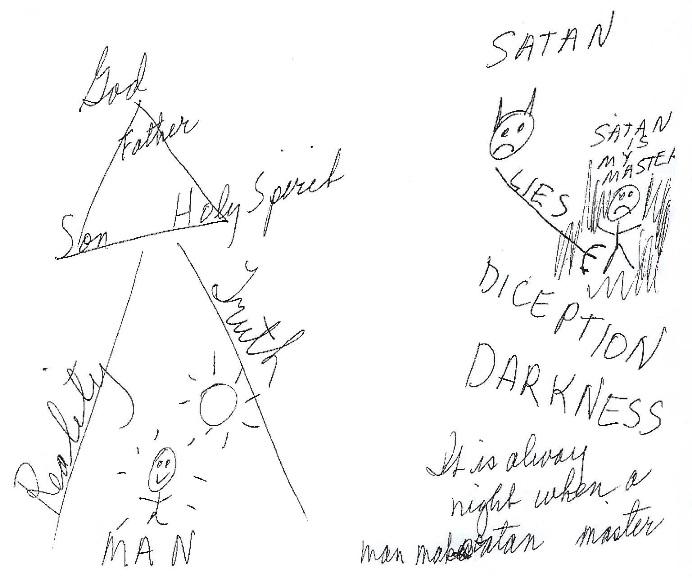
Grace Permeates Nature
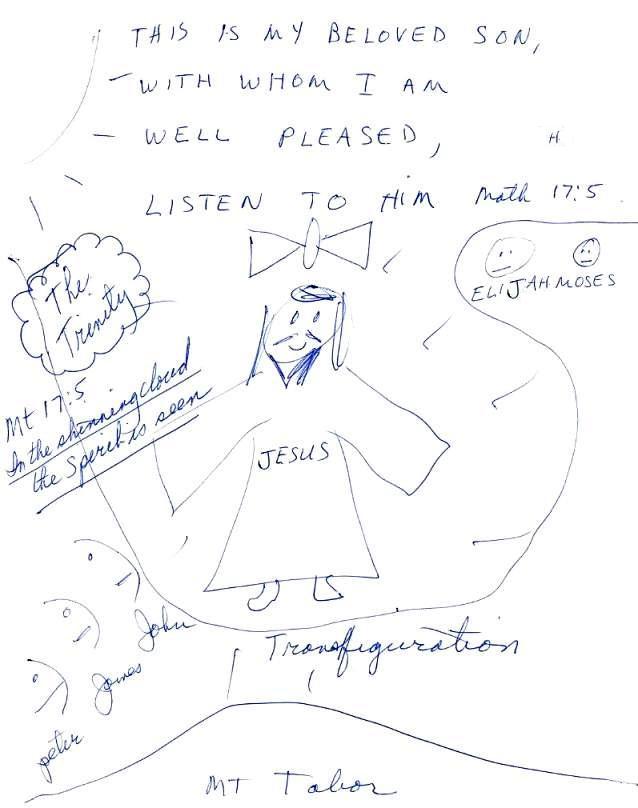
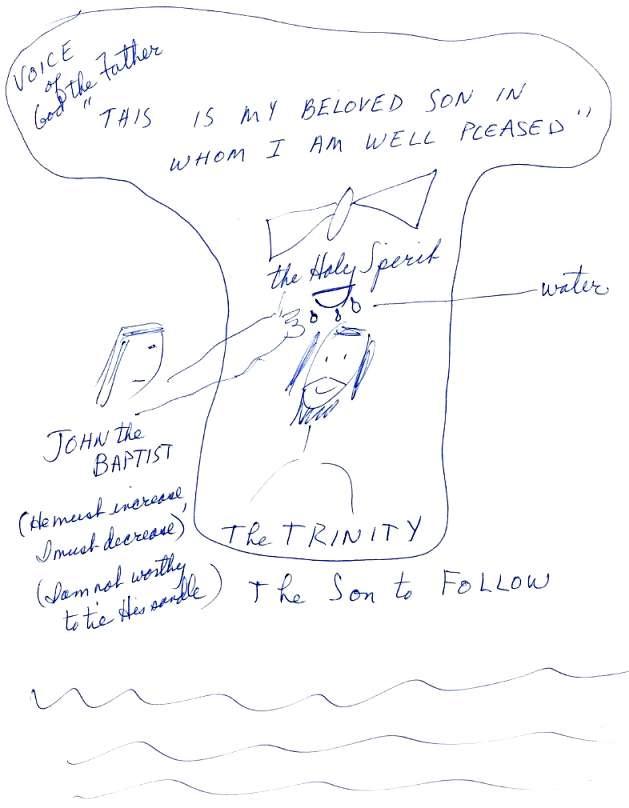
December 27, 2002
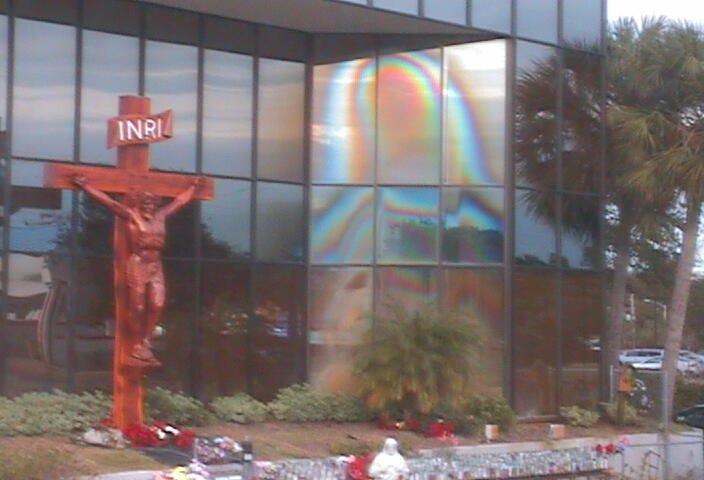
December 21, 2002



Excerpt from Response to God's Love (excerpt) by Fr. Edward J. Carter, S.J.
3
Our incorporation into the mystery of Christ at baptism initiates us into a life that God intends to develop into full maturity. Our life in Christ as guided by the Spirit is not a static given, a life that is received in baptism and then simply clung to. It is not a life that we are merely to avoid losing through serious sin. Rather, it is our task to develop this life through a process of evolutionary growth. God has truly placed us in a situation of becoming. Our personal uniqueness is meant to gradually unfold into its full stature in Christ as we increasingly fulfill God's will in deepening faith, hope, and love.
For each individual, the process of becoming is intertwined with God's plan of growth for all creation. To understand the individual Christian's situation as one of process, of becoming, it is obviously helpful, then, to realize that he or she is part of a larger picture of becoming. Consequently, let us consider three aspects—the world, the Church, and the individual Christian—all of which are in a state of becoming.
Theme II - The Concept of the Christian Life
Five different views of the Christian life
One basic reality includes the other four
Talking about the Christian life from five different perspectivesWhat follows will be these 5 perspectives
A. The Christian life considered as response to God's love
B. The Christian life considered as participation in God's life
C. The Christian life considered as elevation of human nature
D. The Christian life considered as the Christ-life
E. The Christian life considered as life in the Holy Spirit
Also: Mary's role in the Christian life
2 Peter 1: 3-7
The generosity of God
By his divine power, he has lavished on us all the things we need for life and for true devotion, through the knowledge of him who has called us by his own glory and goodness. Through these, the greatest and priceless promises have been lavished on us, that through them you should share the divine nature and escape the corruption rife in the world through disordered passion. With this in view, do your utmost to support your faith with goodness, goodness with understanding, understanding with self–control, self–control with perseverance, perseverance with devotion, devotion with kindness to the brothers, and kindness to the brothers with love.
1 Corinthians 10: 31
Whatever you eat, then, or drink, and whatever else you do, do it all for the glory of God.
3 Loves
(1) Love of God
(2) Love of self
(3) Love of neighbor
1 John 4: 19-21
Let us love, then,
because he first loved us.
Anyone who says ‘I love God’
and hates his brother,
is a liar,
since whoever does not love the brother
whom he can see
cannot love God whom he has not seen.
Indeed this is the commandment
we have received from him,
that whoever loves God,
must also love his brother.
Song: God's Love
C. The Christian life considered as elevation of human nature
Response to God's love as elevation of human nature
In Baptism a person receives a sharing in God's life
The human person receives a new sharing in God's life
Super natural - above and beyond human nature
- life of Baptism
- life of grace
- Christ life
1) Elevation - new life in Him
God is triune - human intellect by itself can never arrive at that truth
WILL - LOVE
2) 1 Corinthians 10: 31
1 Corinthians 10: 31
Whatever you eat, then, or drink, and whatever else you do, do it all for the glory of God.
Our life is permeated to a new level in Christ through baptism
Our intellectual capacity is elevated
We have a new power of knowing through Baptism. FAITH IS PARTICIPATION IN GOD'S KNOWING
LIFE of BAPTISM permeates all of human nature
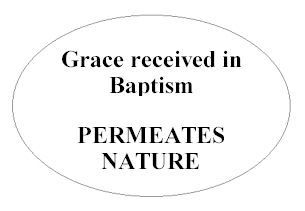

D. The Christian life considered as the Christ-life
1) Scripture
a) Romans 6: 1-11
Romans 6: 1-11
Baptism
What should we say then? Should we remain in sin so that grace may be given the more fully? Out of the question! We have died to sin; how could we go on living in it? You cannot have forgotten that all of us, when we were baptised into Christ Jesus, were baptised into his death. So by our baptism into his death we were buried with him, so that as Christ was raised from the dead by the Father’s glorious power, we too should begin living a new life. If we have been joined to him by dying a death like his, so we shall be by a resurrection like his: realising that our former self was crucified with him, so that the self which belonged to sin should be destroyed and we should be freed from the slavery of sin. Someone who has died, of course, no longer has to answer for sin.
But we believe that, if we died with Christ, then we shall live with him too. We know that Christ has been raised from the dead and will never die again. Death has no power over him any more. For by dying, he is dead to sin once and for all, and now the life that he lives is life with God. In the same way, you must see yourselves as being dead to sin but alive for God in Christ Jesus.
b) 2 Corinthians 4: 7-11
2 Corinthians 4: 7-11
The hardships and hopes of the apostolate
But we hold this treasure in pots of earthenware, so that the immensity of the power is God’s and not our own. We are subjected to every kind of hardship, but never distressed; we see no way out but we never despair; we are pursued but never cut off; knocked down, but still have some life in us; always we carry with us in our body the death of Jesus so that the life of Jesus, too, may be visible in our body. Indeed, while we are still alive, we are continually being handed over to death, for the sake of Jesus, so that the life of Jesus, too, may be visible in our mortal flesh.
c) nature - pattern
- structure
Nature is a principal of operation
Everything must respect its nature
A fish cannot come out of water and live
We must respect our nature to grow and live
2) The new life at Baptism gives us a new nature - a capacity to know and to love which we do not have without Baptism
We can do Christlike activities through the virtues of faith, hope and love, and others
3) The Christic-self
-We have a personal relationship with Jesus
- Galatians 2: 19-24
Galatians 2: 19-24
In fact, through the Law I am dead to the Law so that I can be alive to God. I have been crucified with Christ and yet I am alive; yet it is no longer I, but Christ living in me. The life that I am now living, subject to the limitation of human nature, I am living in faith, faith in the Son of God who loved me and gave himself for me. I am not setting aside God’s grace as of no value; it is merely that if saving justice comes through the Law, Christ died needlessly.
- Jesus has a personal unique love for me
- Christ is the mediator between God and man -
Jesus says quote -
"No one can come to the Father except through me"
John 15: 11-17
John 15: 11-17
I have told you this
so that my own joy may be in you
and your joy be complete.
This is my commandment:
love one another,
as I have loved you.
No one can have greater love
than to lay down his life for his friends.
You are my friends,
if you do what I command you.
I shall no longer call you servants,
because a servant does not know
the master’s business;
I call you friends,
because I have made known to you
everything I have learnt from my Father.
You did not choose me,
no, I chose you;
and I commissioned you
to go out and to bear fruit,
fruit that will last;
so that the Father will give you
anything you ask him in my name.
My command to you
is to love one another.
My personal relationship with Jesus takes into account my personal uniqueness.
We can study the The Christian's Personal Uniqueness in Chapter 2 of Response to God's Love.
I am in the process of becoming, this is discussed in Chapter 3 of Response to God's Love.
Like a baby coming out of the womb, the baby develops intellectually. We develop more every day in our spiritual life to be more in His image and likeness if we stay rooted in Him.
E. The Christian life considered as life in the Holy Spirit
1 Corinthians 2: 6-16
1 Corinthians 2: 6-16
But still, to those who have reached maturity, we do talk of a wisdom, not, it is true, a philosophy of this age or of the rulers of this age, who will not last long now. It is of the mysterious wisdom of God that we talk, the wisdom that was hidden, which God predestined to be for our glory before the ages began. None of the rulers of the age recognised it; for if they had recognised it, they would not have crucified the Lord of glory; but it is as scripture says: What no eye has seen and no ear has heard, what the mind of man cannot visualise; all that God has prepared for those who love him; to us, though, God has given revelation through the Spirit, for the Spirit explores the depths of everything, even the depths of God. After all, is there anyone who knows the qualities of anyone except his own spirit, within him; and in the same way, nobody knows the qualities of God except the Spirit of God. Now, the Spirit we have received is not the spirit of the world but God’s own Spirit, so that we may understand the lavish gifts God has given us. And these are what we speak of, not in the terms learnt from human philosophy, but in terms learnt from the Spirit, fitting spiritual language to spiritual things. The natural person has no room for the gifts of God’s Spirit; to him they are folly; he cannot recognise them, because their value can be assessed only in the Spirit. The spiritual person, on the other hand, can assess the value of everything, and that person’s value cannot be assessed by anybody else. For: who has ever known the mind of the Lord? Who has ever been his adviser? But we are those who have the mind of Christ.
The spirit of the person within knows the person.
Other people can know a lot about us, but nobody knows me as I know myself in the depth of my being.
With regard to knowledge of God, the Spirit of God knows God.
The Holy Spirit teaches us about LIFE, about divine life.
We live a God-like life. We must listen to the Spirit.
The Spirit teaches us about the God-like life.
We live our lives after Baptism with this elevated human nature. We want to always remain in the state of grace.
We want to be filled with His grace, His life.
Excerpt from The Pain and the Joy, by Father Edward Carter, S.J.
2
Certain people look upon religion as a type of enslavement. Religion, claim these people, puts shackles on one's desires for full living, pleasure, and happiness. Religion, they continue, makes you fearful, forces you into a rigid pattern of dos and don’ts which restricts and even suffocates your thrust toward full personality development. Whatever the causes may be for one's arriving at this view, such an attitude grossly misrepresents the nature of true religion.
Jesus has come to make us happy, not to make us participate in a religion which destroys the joy-dimension of human life. Jesus has come to increase our capacity for true self-fulfillment, not to restrict us with a religion which (while encouraging morbid self-enclosement), destroys possibilities for healthy self-expansion. Jesus has come to show us the way to true pleasure, not to present us with a religion which looks askance at such. Furthermore, this happiness and fulfillment which Jesus has come to give us is meant for this life as well as for eternal life. Christianity is a religion which gives a here-and-now happiness that develops into a future and eternal happiness. It satisfies our deepest desires to be fully alive. Furthermore, Christianity is a religion which unites pain and joy.
Christ's followers have looked upon His sufferings—which culminated in the agony of Calvary—and have been moved to a most unique kind of compassion; for the sufferings of Jesus are those of the completely innocent one, sufferings of an extremely kind, sensitive, and loving man. Here was a man who had done nothing but good, and yet, in the end He suffered rejection, betrayal, and denial.
Nevertheless, this classical figure of suffering and pathos who is Jesus is also the classical figure of hope. The crucified Jesus is the great symbol of hope because His suffering and death point beyond Calvary to His Resurrection. The suffering and pathos of Jesus opens up into hope-causing and joy-causing resurrection. The Jesus who exacts compassion from His followers is the same Jesus who fills them with resurrection joy, peace, and happiness. Jesus allows the Christian to see that suffering is not meant to be self-enclosed, but rather open-ended. Suffering is meant, when properly assimilated, to lead to greater life, to greater love, joy, and happiness.
The pain and the joy of life are inevitably linked together. Let us not try to separate them. On the one hand, let us not narrowly view life's suffering so that we fail to see it as a means, if properly encountered, to a fuller life. On the other hand, let us not so exclusively focus on the aspect of joy that we fail to remember that its presence in our life cannot be maintained and deepened unless we are willing to suffer with Jesus. Pain and joy—what God has joined together, let us not strive to separate.
Dying and rising were inseparable in Jesus' existence. Since we have been baptized into Christ's death-resurrection, as St. Paul tells us (Rom. 6:1-11), dying and rising are also inseparable in our own existence. The pain and the joy. In experiencing humanity, the Christian must assimilate both according to God's designs.
6
Faith, Hope, and Love
Faith, hope, and love are the three main Christian virtues. All the other virtues, important as they are, ultimately are at the service of faith, hope, and love. Let us look at this triad.
Today's Christian does not live in a time outstanding for its religious faith. Long ago, in the golden age of Christendom, a Christian faith-milieu was much more in evidence. Many with whom one lived and worked were co-believers. Today, a considerable part of our culture is not only non-Christian, but is also rife with secularism and hostile to religious belief. However, whatever may be the problems and difficulties relative to faith in this or any age, we know that God sustains the believer. God distributes graces commensurate with the difficulties which may confront the person of faith.
Faith gives us a new vision regarding God and all reality. Out of this vision, new relationships emerge. Faith relates us to God in a new way, and to the human family and the rest of creation.
Hope allows us to desire to live the vision of faith and to trust that God will assist us in living according to what faith proposes.
The exercise of hope does not always come easily. In times of greater difficulty or crisis, we realize this. Yet it is precisely at these times that we have a special need for hope. Despite the suffering, we must trust, even though the darkness seems to be enshrouding us.
God can accomplish great things through us if only we cooperate. What God accomplishes through us may, to a considerable extent, be hidden from others. True greatness, however, is still there. If we are to achieve truly great things—great in the eyes of God—we must trust. We must trust that God will lead us on to Christian maturity. We must trust that God will aid us in fulfilling our mission in life. Even at those times when we are painfully aware of how weak we are, we must trust that we can accomplish the task God sets before us. Actually, at those times during which we are especially experiencing our weakness, our optimism should grow. The more we realize our weakness, the more we should throw ourselves into the arms of Christ. We then are strong and secure in His strength. As long as we do not surrender to our weakness, we can glory in our helplessness so that the strength of Christ may support us. This was the attitude of St. Paul:
Therefore, I am content with weaknesses,
insults. . .persecutions, and constraints, for the
sake of Christ; for when I am weak, then I am
strong. (2 Cor. 12:10).There is the virtue of faith, there is the virtue of hope, and, as the queen of all virtues, there is love. St. Paul reminds us, So faith, hope, love remain, these three; but the greatest of these is love. (Cor. 13:13).
We live successfully to the degree that we love. Jesus has told us this. Jesus has summarized His religion in terms of love. The Incarnation, indeed, is a work of love. In the Gospel of John we read,
For God so loved the world that he gave his
only Son, so that everyone who believes in him
might not perish but might have eternal life.
(Jn. 3:16).These words remind us that our insight into the Christ-event deepens as we consider it in the light of love. Thus, we should think primarily in terms of love. Christ aids us in this endeavor by showing us His heart as symbol of God's overwhelming love for us. The heart of Christ also calls us to respond—by living our lives out of love for God and neighbor.
It is one thing to recognize the primacy of love. It is another thing to live it. Merely knowing that Christianity is summarized in terms of love is not enough. We must allow this truth to penetrate into our inner depths and to influence the way we think and act. We must consistently live according to love. We must not fall into the error which says that knowledge is virtue—that to know the good is necessarily to act accordingly. We know from painful experience that this is not true, that our activity can proceed in a direction opposite to what we know is right. We can think love, and yet act selfishly. We can know that we achieve real happiness only when we love properly, and yet we can choose to try to find happiness in other ways. We can know that our Christian personalities develop and expand through love of God and neighbor, yet at times we foolishly choose a process of self-enclosement—which is what actually occurs when we refuse to love.
Although we have sometimes failed to love as we should, we are not hopelessly depressed by this fact. We also know that many times we have cooperated with God, and we have loved. We know that in certain instances we have even surprised ourselves because of the height and the depth of our love.
Jesus, then, has come to teach us the primacy of love. He went to extraordinary lengths to impress us with this truth—that love is the chief element of Christianity. Spurred on by love's relentless drive, He embraced the horrors of Calvary's cross. He stretched out His arms on this cross, begging us not to miss His message of love, showing us that love is not measured, but lavish in its outpouring. We should have to plead guilty to an extreme insensitivity if the lesson He has so strikingly taught us makes little impression on the way we live. Let us live love, striving to live it with our entire beings, living it in full measure. This is what it means to be a committed Christian.
26
Shattered Dreams
To hear the words "shattered dreams" conjures up for us memories of major disappointments experienced along the ever-changing path of life. The disappointments can be those which wound the heart to its core. Disappointments of lesser proportions cause diminished pain, but still a kind which leaves its mark.
Shattered dreams come in all sorts of sizes and shapes. Some experience career disappointments even though they were privileged to enter the work of their dreams. Once professional success was achieved, however, a type of emptiness ensued and, with puzzlement, they asked themselves, "Is this all the satisfaction that comes from all my strivings? Is this all there is to professional success?"
Others experience shattered dreams because the careers they hoped for were always beyond their grasp. For this or that reason they were not able to give themselves completely to that work or occupation for which their hearts yearned. For example, one with outstanding talent as an artist can only give a bit of free time to expressing his or her genius because financial problems force the person to work full-time at another occupation. The heartbreak this occasions can only be known by one who has experienced this kind of frustration. An athlete on the verge of national stardom sustains a serious injury which necessitates abandonment of a cherished sport. These and similar examples leave one with the question: "What would it have been like?. . .I'll never know."
Personal relationships have yielded a plethora of shattered dreams. A person experiences crushing disappointment because he or she is rejected by a person dearly loved, a person who had been the focus of so many hopes and dreams. Another experiences pain because the hoped-for relationship with a particular person never eventualizes. In both cases tears flow copiously and the person has to strive mightily to convince oneself that life is still worth living.
The shattered dreams of parents regarding their children—this particular kind of pain makes up a considerable portion of life's sufferings. For example, a child with so much to live for is snatched away in sudden, unexpected, and tragic death. Or parents watch a child slip away from their influence and go the way of moral degradation despite the parents' best efforts to provide proper guidance. Other situations involve financial problems which prevent the desired education of exceptionally gifted children—an education the parents had so much hoped for.
There are many examples of shattered dreams. You know of other examples, ones which you have personally suffered, and others which you have seen others experience. All examples involve shattered hopes, whose remains are scattered about in the form of burnt-out ashes, the remnants of goals once eagerly sought, but which now no longer exist.
As Christians we too are subject to experiencing shattered dreams along with the rest of the human race. However, being exposed to various disappointments will not excessively disturb us if we rely on our Christian perspective. To be able to view disappointment in union with Christ is a great gift which all do not possess.
With the light afforded by this Christian perspective, we should ask ourselves whether the shattered dream was the result of seeking that which was outside of God's will. Sooner or later such a pursuit always causes a sense of emptiness, disappointment, disillusion. Disappointment can also result from the relative failure of doing that which we thought to be Spirit-inspired. The disappointment attached to such a venture, however, is permeated with a distinct sense of peace; for we realize we have done our reasonable best to follow God's lead. Our effort has failed in one sense; but in another sense, we have succeeded. We know that good has emanated from our conformity to God's will.
Individual shattered dreams do not destroy the all-pervading dream or hope of the Christian. We know that if we remain basically faithful to Christ, our dream, or hope, regarding our earthly destiny will be fulfilled. We further know that this dream or hope for a truly successful existence on this earth will open up to absolute fulfillment in eternal life. The committed Christian, then, can experience shattered dreams, but not a shattered life, for in them we can also recognize a challenge and a cross to carry. He has asked us to pick up our cross and follow Him.
31
Failure
One of the most painful sufferings we experience within the human condition is failure. The suffering is often exacerbated because we over-identify with the situation. We have linked too much of our being with the task, the relationship, or whatever else has prompted the failure. We tend to think, for example, that because we have failed in a particular work, we have failed as human beings. However, as much as we may have involved ourselves in the work, we are not the work itself. This is not to say we are always blameless. We may be considerably at fault regarding the failure. On the other hand, we may be basically without culpability. Whichever the case, we must strive not to over-identify with the situation. This only increases the pain, and needlessly so.
Besides over-identifying with failure, there are two other sufferings connected with it. There is very obviously the pain of the failure itself—even when we succeed in keeping it within proper perspective. There is also the pain of regrouping, of starting over, of getting on with the rest of life. This is not easy; but the pain involved is less than that which results from remaining mired in the failure, allowing it to rob us of some of the joy which is meant to be ours. There have been, are, and will be failures of various kinds and degrees in our lives. Let us accept the pain involved, learn from it, and continue the spiritual journey as wiser human beings.
32
Loneliness
Loneliness is an experience which afflicts every human being to one degree or other. No one escapes its suffering. Its pain can vary from being no more disturbing than that of other common sufferings, to a kind of affliction which penetrates to one's inner depths and makes one shed copious tears.
There are two basic kinds of loneliness: the one which need not be, and the one which is inevitable. The one which is avoidable emanates from our not relating to God and others as we should and can. The other, which exists even though we are doing our reasonable best to reach out to God and neighbor, is simply a part of the human condition. We experience an unavoidable loneliness because we are pilgrims. Until our pilgrimage ends in the attainment of eternal life, loneliness will always haunt us in various degrees. This must be, for the kind of loneliness which is inevitable results from our not yet being completely fulfilled. We attain perfect fulfillment only in eternal life. Until then we are, in part, lonely creatures.
If unnecessary loneliness results from our not relating properly to God and others, the remedy for lessening its suffering is obvious. We must strive to grow in our relationships with God and others. This is not going to completely remove loneliness, but it will lessen its pain and make it more bearable.
In coping with loneliness we experience ups and downs in the process, and even apparent contradictions. For example, in striving to deepen my relationship with a significant person—a step which basically lessens loneliness—I may still experience it on occasion because of prolonged physical separation from this person, or because of misunderstandings which temporarily seem to separate us to some extent. Regarding God, at times one can feel a particular loneliness precisely because one desires God so much; but for now, God seems hidden and difficult to contact. Some experience this suffering in a very penetrating fashion as they undergo the classical dark night of the spirit; others feel this loneliness in a less striking, but still very real, fashion.
Loneliness resulting from our efforts to relate properly to God and others is not debilitating as is that which emanates from our failure to go out to God and others as we should. This is so because the former constitutes part of the positive growth process.
The temptations which confront the human person in his or her struggle with loneliness are numerous and well known. Seeking alleviation from loneliness in alcohol and other drugs, in illegitimate sex, in excessive TV watching—these are a few of the escape routes well known to the modern world. Whatever the false escapes, they seem to be more prevalent in affluent cultures where money can buy practically any false comfort one could desire.
Here in the United States, the affluent American can easily buy all the non-authentic escapes from loneliness. These false routes beckon us so enticingly, promising a quick solution to our problem. As with anything non-authentic, however, embracing them as a cure for loneliness actually makes the problem more severe. So it is not surprising that a group of experts has concluded that loneliness is a serious problem in today's world, and nowhere does it seem to be greater than in the United States.
In coping with the problem of loneliness, we should look at the phenomenon realistically. This realistic view tells us that loneliness will always be with us to some degree. Dealing with the problem does not mean eradicating all loneliness. It means making sure that we are not causing ourselves unnecessary loneliness by failing to relate to God and others as we should. In other words, it means we should strive to love as we should. The person who is trying to love properly is not a person who escapes all loneliness. He or she is a person whose basic happiness, loneliness does not destroy.
36
Involvement with the World
The world belongs to Christ. Because of our love for Christ, we must be concerned with that which is His. It is the Christian's duty, therefore, to share responsibility for furthering the world's progress according to the designs of its Creator.
Our love for neighbor also prompts us to be concerned about the world. We and our neighbor do not live in a vacuum. We are affected by the type of world which surrounds us. If we say we love our neighbor—and ourselves—we must do our part in helping to make this a better world in which to live.
There are two radically different ways in which one can be involved with the world—the incorrect way and the proper way. The incorrect type of involvement has often been called secularism—secularism being that view of the world which has little or no role for God and religion. The correct manner of involvement is, of course, to follow the lead of God's will. God calls all of us to some engagement with the world. Contrary to what some think, the monk also must have a concern for the world according to his vocation. It is not a question of whether or not to be involved with life in the market place. We must rather ask, "How does God want me to be involved?"
We are involved in the world in either a more individualistic way or in a more communal manner. Both ways have their advantages.
The more individualistic way has the advantage of presenting us with a constant opportunity to help promote the world's goodness and to work against its evil aspect. This manner of involvement simply consists in our carrying our Christian principles into the market place. Whatever we do should spring forth from these principles. In this way, although we may not be attracting much notice, we are doing our share to help further develop the world's God-given goodness.
The other manner of involvement—the more communal way—brings us together in group activity. It is a situation of being united with others to promote this or that good. The advantage of group activity is twofold: it provides corporate support and encouragement, and it usually has greater impact than do mere individual efforts.
These two ways complement each other, so let us then use both. There is so much to be accomplished. Let us labor while there is still time. Jesus has left us these words:
We have to do the works of the one who sent
me while it is day. Night is coming when no
one can work. (Jn. 9:4).
38
Marriage
Marriage is an especially intimate union in which man and woman pledge to share each other's uniqueness in a way which is as awesome as it is beautiful. If a marriage is to be this awesomely beautiful union, the partners must be willing to love authentically. Authentic married love is much more than a warm, romantic glow. This may or may not be present at any given moment of married life, but what should be consistently present is a willingness to give of oneself to the other in order to promote her or his real good. This is true love. This is authentic love. This is the kind of love which prevails in the midst of myriad types of experiences.
All sorts of experiences will mark the path of a married couple as they walk the way of life in a togetherness formed by their mutual love. As their love for each other has initially created this unique togetherness, so will it likewise establish a unified and meaningful existence comprised of happenings and experiences spanning a rich and diversified spectrum of life within the human condition. Their love for each other thus provides a common basis for all kinds of experiences. Ecstatic happiness and deep anguish, such different experiences in one sense, are in another sense similar experiences for husband and wife united in love. The similarity arises because it is the same love which makes the two consistently, tenderly, and beautifully desire to share all experiences. Similiarity thus harmoniously blends with dissimilarity.
This extremely close, unifying love of man and wife is expressed in a most special manner through sexual intercourse. The sexual act is the outward, culminating sign of the partners' pledge to give themselves as completely as possible to each other. It is obvious then, that the sexual act is more satisfying in proportion to each partner's willingness to give of self as much as possible. The woman is usually the more perceptive in this since, compared to the man, it is generally more difficult for her to separate love and sex. If there are, consequently, significant problems with the marriage outside the times of intercourse, this negatively affects the woman's attitude toward the sex act itself. In other words, if her husband is seriously and consistently lacking in giving himself to her in the varied aspects of daily married existence, she intuitively sees the problem with the sexual side of the relationship. Intercourse, ideally the outward sign of the desire of both to give themselves as perfectly as possible to each other in all areas of married existence, certainly suffers when one or both are significantly lacking in this self-gift. A satisfactory sex life is therefore contingent upon the partners' readiness to work effectively at promoting the marriage's growth in all its other aspects. Among other things, this requires a willingness to engage in consistent and meaningful communication.
The marriage union gives a basic orientation to one's stance before God. Ideally, it is a question of approaching God in various ways with another person. This does not mean that a married person does not often approach God singularly. The undeniable truth, however, does remain—married people in many ways stand together before God in love, and together receive God's love.
Married people relate in love not only to God, but to each other, and to their children. They are also meant to relate in love to all others. Here again, marriage is a school of love. Husband and wife, in their mutual sharing of love, grow in their knowledge of how to give and receive love regarding those outside the family circle. They should thus realize their responsibility in contributing to the building of a better world. Man and wife, precisely because of their married love, have their own special responsibility to the secular world. Married love obviously is intimately connected with procreation—with the continuation of the human race, with life upon earth. Life in this world has a quantitative aspect—population numbers—and a qualitative aspect—the kind of life this population lives. There is a connection between the two, because the dignity of the human person requires that the quality of life be fundamentally sound. Consequently, in assuming responsibility to help populate the world, married people are also assuming responsibility to help make this world a more fitting place for their children and others to inhabit.
Our day is witnessing an unusually large number of unhappy and broken marriages. This is a tragedy. It is a tragedy that what is intended to be a uniquely beautiful union often never becomes that, or, once that, disintegrates, and there remain only the ashes of a burnt-out beauty that once was, but now is no more. We mourn these unhappy marriages. We thank God for the happy ones, the beautiful ones, ones which are a testimony to marriage's capacity come what may, to unite husband and wife in loving and tender concern. The world desperately needs it.
One common thread of advice from couples who have enjoyed many years of marriage is to pray together. Begin that way, and stick to it.
40
Friendship
One of the grandest forms of love we can show for someone is that of friendship. One of its beauties is that it is available to persons of all ages and all vocations. Each of us belongs to a particular state of life and gives and receive love according to the basic dictates of that special vocation. Single and married people in the world, religious, clergy—all of us are meant to love and be loved. Although many of the experiences of love are the same for all, others are indigenous to the particular state of life in question. For example, the celibate cleric is closed off from the experience peculiar to married love just as man and wife, in turn, are not exposed to the pains and joys of celibate love. However, one of the common experiences of love we can all share is that of friendship.
In the course of our daily lives we deal with many people, and some of these we meet rather regularly. We can thus establish amicable relationships with a number of people. We can develop many friends in the process. Deep friendship, however, friendship in the stricter sense of the word, is another matter. For various reasons it seems we establish this type of relationship with only a relatively small number of individuals. Whatever may be the degree and kind of friendship, it is a special gift of God. It indeed plays a treasured role in the Christian life. Christ Himself has shown us this; He, too, had friends, such as Lazarus, Martha, and Mary.
What is friendship, this special, close friendship? It is a mutual self-giving in love. Through this gift of self, friends desire to promote the good of each other. In one's love for a friend, he or she desires that this person becomes everything the friend can become according to God's designs. Through the love of friendship we give ourselves in a very direct, personal, and intimate manner to help achieve this growth.
The desire to give ourself to a friend in such an intimate fashion necessitates that the other also love in return with the love of friendship. You cannot give to another on such a deep level unless that person reciprocally and similarly loves and accepts you as well. The love of friendship, consequently, means a decision to love and be loved in a similar fashion on the part of both.
One of friendship's most distinctive qualities is this mutual acceptance which is given in complete freedom. Friends are radically free to desist loving each other with the love of friendship at any time; yet the fact that they continue to love is one of friendship's glories. Obviously, this is not to say that each and every friendship perenially endures. Sometimes one or both decide for various reasons to end the relationship. Nevertheless, ideal friendship is forever. This demonstrates the necessity of not entering into such a union unless sufficient thought and reflection concerning the responsibilities of friendship have preceded. Full, deep friendship is an important human relationship, and we should treat it in a commensurate fashion.
Friends look at life together and they live life together. This is why there must be a basic affinity between the two, a basic set of common values and ideals. Otherwise, the close union of friendship does not seem possible. On the other hand, this basic affinity does not exclude all differences. Each person in the friendship is unique and will give his or her individuality to the other with the inevitable differences which distinguish one person from another. These personal differences, properly blended into the unity of friendship, help to enrich the relationship, and each other.
Since friendship is a form of love, it is a life, and as with all life, it must be properly nourished; otherwise, it will wither and die. Each person must realize his or her responsibility in keeping friendship alive and healthy. Notice, we are not saying friends should be morbidly anxious regarding the future of their relationship. We are merely stating that friends, while resting secure in their mutual love, can never afford to take each other for granted.
Friendship is a school of love. Through it God intends to make us Christians who love more sincerely, more deeply, more selflessly.
Since friendship is a school of love, it is evident why it cannot be exclusive. A friendship which makes me less loving toward others needs examination. Although I have a special love for my friends, I cannot neglect a loving concern for all. Jealousy and neglect of duty emanating from a friendship are other indications that not all is right with the relationship. These and other possible negative characteristics should not overly surprise us when they appear, especially if they occur in a minor way. They are simply a sign that we are still learning to love, and that at times we fail to a lesser or greater degree. Negative characteristics of a serious nature, however, should either be eliminated or basically controlled. If there is a serious disorder which is not rectified, the course of action seems obvious. The friendship—or what was a friendship—should be terminated, for the relationship has ceased to be a fundamentally sound form of love.
As always though, we should stress the positive. We should be optimistic about our friendships, confident that with God's grace they will remain what they should be. Christ is the mediator of this grace; it is in His presence and in His assistance that our friendships are to be rooted. In this manner they will flourish and become more beneficial, more profound, and more beautiful.
44
Love and Communication
There is a close connection between the gift of self in love and the process of communication. God is the prime example of this. The Father gives Himself to us through the mediatorship of His Son Jesus and accompanying this gift is the divine process of communication. While on earth, Jesus, through word and action, continually revealed the Father, the Father's love for us, and the Father's plan for us. In other words, Jesus was explaining, He was communicating concerning God's gift of love. This process continues as Jesus continues to speak to us through the Spirit.
In our love relationships, there also must be appropriate communication. Between wife and husband, parents and children, friend and friend, fundamental communication must be present if the relationship is to be basically healthy and evolving. Love includes the willingness to communicate.
While communication through words is obviously very important, it is not the only form of communication. Our actions, our total demeanor, are also critical vehicles of communication. As a matter of fact, if one's actions do not basically correspond with one's verbal communication, the words themselves become strongly suspect.
Concerning verbal communication, it is not the quantity of words which is most important—although there is a basic adequacy required in this regard. More critical, though, is the quality of words. Two persons can talk over lengthy periods, but, substantively, not much is being communicated because of the rather superficial level of dialogue.
For true communication to exist between two persons, there is no need for one to speak as much as the other. One person may be of a more talkative nature, the other, of a more reticent bent. As long as each respects the temperament of the other, real communication takes place between such opposites.
The ability to communicate, rather paradoxically, requires the capacity not to speak. In other words, good communication requires that each person be a good listener. Each must sincerely want to hear what the other is saying. One must listen not with a defensive attitude, nor with an attitude which effectively says, "Hurry up so I can begin talking," but rather with a patience which realizes that love includes the desire to try to understand what the other is really feeling and trying to communicate.
Some think that real, ongoing communication in a relationship becomes more difficult over time. Actually, it seems a distinction should be made. In one sense, it seems communication becomes easier as time goes by. The persons know each other better as time progresses, and feel more at ease in the process of communication. On the other hand, if the relationship is truly growing, this means that a deeper love is being shared. Deeper love, in turn, demands a deeper level of communication. In this sense, it seems communication becomes more challenging over the months and years of the relationship.
What about arguments? Does true love, true communication exclude these? I think most would say "no." If the arguments are carried on with loving respect for the other, and with a positive purpose, then argumentation has a place in the ongoing communication process. If the arguments are frequent, however, it seems that something is awry in the relationship and that this very issue—having frequent arguments—should become matter for discussion.
It is not only our more intimate relationships which require proper communication. Our more general ones do also. Proper communication between employer and employee, between teacher and student, between doctor and patient—these are a few examples of the proper dialogue which should be present in our daily existence if needless frustration and other kinds of suffering are to be avoided.
We are followers of the Word made flesh. As the process of communication was so important to the love-mission of Jesus, likewise it is important to us who have been called by Him to aid in the continuation of His work upon earth. Communication has its painful moments, but the joy of a relationship will be wanting if it is not properly present.
(End of Excerpt from The Pain and the Joy)
Given
October 29, 2016
R.
Please spread blessed holy water
(You can also mix Jesus and Mary water
with your blessed Holy Water if you have it.)
in your yard, around your house,
in the state you live in.
And ask God to bless your state
Ask God to bless the United States
Pray all prayers through the intercession of
Our Lady of CLEAR – WATER.
Ask the Lady of CLEAR - WATER
to help with the blessed water.
Mary has appeared to me for 22 years,
in Ohio and Florida.
Give
the gift that Counts
this Christmas!











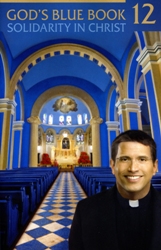







21 Blue Books
1, 2, 3, 4, 5, 6A, 6B, 6C, 7, 8, 9
10, 11, 12, 13, 14, 15, 16, 17, 18, PBB
for $75 plus postage
Special Offer
| Rita Ring | ||||

|
|
Mass Book,
by Rita Ring: Many of the entries in the Priestly Newsletter
Volume II from a spiritual journal came from this book.
These entries |
|
|
|
|
||||

|
|
Rosary Meditations
for Parents and Children,
by Rita Ring, Short Meditations for both
parents and children to be used when
praying the |
|
|
|
|
||||

|
|
God's Blue Book I by Rita Ring. Open Anywhere This book will change your life. These are beautiful love letters to us from Jesus. A million books have been printed and circulated. Jesus loves us so much He wants a personal relationship with us He wants us to go to the Eucharist and be with Him before the tabernacle. $10 |
|
|
|
|
||||

|
|
God's Blue Book II by Rita Ring. Letters from Jesus about His on fire love Jesus wants this great intimacy with us On fire love Personal love letters from Jesus about the love of His Heart A book on surrender Fr. Carter said! $10 |
|
|
|
|
||||

|
|
God's Blue Book III by Rita Ring. Fr. Carter's favorite book It is about loving and forgiving each other Being pure in heart A book for unity in family, community, in life!! $10 |
|
|
|
|
||||

|
|
God's Blue Book IV by Rita Ring. This book is about the love Jesus has for Mary and Mary has for Jesus and Jesus and Mary have for us It is truly the Love of the Two Hearts. Mary appeared every day at the Holy Spirit Center Fr. Carter was there. Mary's first apparition July 5, 1994. $5 |
|
|
|
|
||||

|
|
God's Blue Book V by Rita Ring. Jesus wants to be the bridegroom of our soul He is our beloved Jesus tells us about pure love how we are to be pure of heart and love God and love others. It is a must, to hear about love from Jesus Jesus is love $5 |
|
|
|
|
||||

|
|
God's Blue Book 6A by Rita Ring. Rosaries from Their Hearts during apparitions. Jesus and Mary appeared every day and I received rosaries from Them and They were transcribed from a tape. Also messages of love from Jesus on days of January, 1995 About Baptism writings from Fr. Carter and the Scriptures. $10 |
|
|
|
|
||||

|
|
God's Blue Book 6B by Rita Ring. Jesus and Mary appeared every day in February, 1995 So beautiful transcribed from a tape the Stations, 7 Sorrows, prayers in the Prayer Manual, the Holy Spirit Novena Book and the Song Book. Pure love loving and forgiving a book about Jesus' love, baptism, grace and Fr. Carter's Newsletter. $10 |
|
|
|
|
||||

|
|
|
|
|
|
|
||||

|
|
|
|
|
|
|
||||

|
|
|
|
|
|
|
||||

|
|
|
|
|
|
|
||||

|
|
|
|
|
|
|
||||

|
|
|
|
|
|
|
||||

|
|
|
|
|
|
|
||||

|
|
|
|
|
|
|
||||

|
|
|
|
|
|
|
||||

|
|
|
|
|
|
|
||||

|
|
|
|
|
|
|
||||

|
|
Apostles Manual. About the Movement — the structure of the Movement All Ministries — from the time 3 months before Mary appeared in Clearwater and 3 months after. Rosaries of the 13ths, Fr. Carter's Newsletters. Messages from God the Father Reaching the priests, the Church, the schools and the world. $20 |
|
|
|
|
||||

|
|
Rosaries from the Hearts of Jesus and Mary Book 1. Mary appeared in Clearwater December 17, 1996 in rainbow color and these rosaries left the printer the same day from Apparitions of Jesus and Mary transcribed from a tape. $10 |
|
|
|
|
||||

|
|
Rosaries from the Hearts of Jesus and Mary Book 2. This is a book of so many rosaries — transcribed from a tape. So many beautiful rosaries. pages $12 |
|
|
|
|
||||

|
|
Messages for the Elderly, Ill and Homebound. This is a big book of loving messages for nursing home people and homebound from Jesus and Mary Their lives are so important united to the Mass offering up their suffering, their lives for the souls of this earth. $10 |
|
|
|
|
||||

|
|
Short Rosary Meditations for the Elderly, Ill and Homebound. This book is so important with pictures they can open it and lay it on their laps and pray the rosary. $10 |
|
|
|
|
||||

|
|
Songs from Jesus Songbook. These loving songs were given from Jesus. So beautiful Love Songs from Jesus of His love — helping us have pure and loving hearts. $3 |
|
|
|
|
||||

|
|
|
|
|
|
|
|
|
||||

|
|
|
|
|
|
|
||||

|
|
Color the Lives of Jesus and Mary. Volumes 1 through 7. Coloring books and meditations for grade school children and others on the mysteries of the rosary — really good. $5 each. |
|
|
|
|
||||

|
|
|
|
|
|
|
||||

|
|
|
|
|
|
|
||||

|
|
|
|
|
|
|
||||

|
|
|
|
|
|
|
||||

|
|
Color the Lives of Jesus and Mary. Volumes 6 through 7. Coloring books and meditations for grade school children and others on the mysteries of the rosary — really good. $5 each. |
|
|
|
|
||||

|
|
|
|
|
|
|
|
|
|
|
||||

|
|
|
|
|
|
|
||||

|
|
|
|
|
|
|
||||

|
|
|
|
|
|
|
||||

|
|
|
|
|
|
|
|||

|
|
|
|
| Fr. Joe Robinson |

|
|
||||

|
|
|
|
|
|
|
||||

|
|
|
|
|
|
|
||||

|
|
|
|
|
|
|
||||

|
|
|
|
|
|
|
||||

|
|
Guiding Light homily series — Reflect on the Word — Cycle B The Word leaves an impression on our souls. In my thoughts and reflections are born a more tangible understanding of these eternal concepts presented in the Gospels and the readings. Anyone can read a sentence, but not anyone can absorb it's true meaning. Truth, in this day and age, is almost a matter of opinion or individual entitlement. We believe that Christ's truth is our Roman Catholic Church. We, as priests, champion it's teachings; we are ambassadors for the Pope and Christ to those faces looking at us. We are the light by which our congregation reads to reflect upon real truth and we do it hand in hand. $15 |
|
|
|
|
||||

|
|
Guiding Light homily series — Steadfast to the Son — Cycle A The sunflower is a great example of how we should be steadfastly guided by light. What a powerful thought that this exceptional plant is not stuck in one pose day in and day out, yet adaptable and magnetized to the sun. We feel the same about our Son. Our heads turns to face Christ as each day presents its challenges to find light. We join together like plants in a field and soak up the Son through the pulpit. We are a warm circle of strength using the wind of our breath to carry our priests' words, Christ's words, to new rich soil. $15 |
|
|
|
|
||||

|
|
Guiding Light — Focusing on the Word — Cycle B At times we may feel that our path to Christ is a bit "out of focus". Like the disciples in the Book of Mark, this ordinary life clouds our vision of Christ's Divinity. We may doubt the practicality or possibility of applying His teachings and example to our modern life. Cycle B's homilies are a "guiding light" to help us realize Jesus' Messianic greatness and His promise of better things to come. $15 |
|
|
|
|
||||

|
|
Guiding Light — Feed My Soul — Cycle C In a world rapidly advancing and encouraging personal gain, we are faced with modern problems. There is a challenge to find time in our busy schedules for Sunday Mass or a family meal. We are able to research, shop, bank and even work without hearing one human voice. It is no wonder that we may often feel disconnected and famished at our week's end. In Fr. Joe's third book of homilies from Cycle C, we are reminded of the charity that Christ intended us to show each other. We have a calling to turn the other cheek and be the Good Samaritan to others. We are rewarded with the Father's kingdom and love when we are not worthy. We are not left alone or hungry. $15 |
|
|
|
|
||||

|
|
Guiding Light — The Word Alive in Our Hearts. — Cycle A (partial) Homilies by the Reverend Joe Robinson given at St. Boniface Church in Cincinnati, Ohio. It is a tremendous honor Fr. Joe has allowed us to share these great gifts with you – for greater holiness and knowing more and more about God. $10 |
|
|
| Fr. Edward J. Carter S.J. |
Here are all the products in this category:
Books written by the founder of Shepherds of Christ Ministries
|
|
||||

|
|
|
|
|
|
|
||||

|
|
Response to God’s Love by Fr. Edward J. Carter, S.J. In this book Fr. Carter speaks of God as the ultimate mystery. We can meditate on the interior life of the Trinity. Fr. Carter tells us about our uniqueness in the Father's Plan for us, how the individual Christian, the Church and the world are in the state of becoming. Imprimatur. $10 |
|
|
|
|
||||

|
|
Shepherds of Christ — Selected Writings on Spirituality for all People as Published in Shepherds of Christ Newsletter for Priests. Contains 12 issues of the newsletter from July/August 1994 to May/June 1996. $15 |
|
|
|
|
||||

|
|
Shepherds of Christ — Volume 2: by Fr. Edward J. Carter, S.J. Contains issues 13—29 of the newsletter (September/October 1996 — Issue 5, 1999) $15 |
|
|
|
|
||||

|
|
Shepherds of Christ — Volume 3 by Fr. Edward J. Carter, S.J. Contains Newsletter Issues 1 through 4 of 2000 including Fr. Carter’s tremendous Overview of the Spiritual Life $10 |
|
|
|
|
||||

|
|
Tell My People. Messages from Jesus and Mary (As given to Fr. Edward Carter, S.J.) One of Fr. Edward Carter, S.J.'s Synopsis of the Spiritual Life From Jesus to Fr. Carter "On Holy Saturday, 1994, Jesus told me that on the following day, Easter, I would also begin to receive messages for others. Our Lord also told me that some of these were eventually to be published in a book and here is that book." $10 |
|
|
|
|
||||

|
|
Spirituality Handbook. Fr. Edward Carter, S.J. did 3 synopsis of the spiritual life. The Spirituality Handbook, the Priestly Newsletter 20he Tell My People book. The way of spiritual life proposed to the members of Shepherds of Christ Associates is centered in consecration to the Hearts of Jesus and Mary. All aspects of the spiritual life discussed below should be viewed as means to help members develop their lives in consecration to Christ, the Sacred Heart, and to Mary, the Immaculate Heart. $3 |
|
|
|
|
||||

|
|
The Spirituality of Fatima by Fr. Edward J. Carter, S.J. The Fatima apparitions and messages received official Church approval in 1930. In giving her official approval to the Fatima event, the Church tells us that what took place at Fatima involving the three young visionaries is worthy of our belief. $5 |
|
|
|
|
||||

|
|
|
|
|
|
|
|||

|
|
Priestly Newsletter — 2000 #1 — CD. — Christ is Our Strength — Fr. Edward Carter, S.J. read it the year he died. It is so beautiful. "This brief passage contains one of the greatest lessons of the spiritual life. As we progress along our spiritual journey, we become increasingly aware of how weak we are in our—selves, but how strong we are in Christ. To experience our weakness involves suffering. The degree and kind of suffering can vary. The suffering can include the experience of the classical dark night of the spirit as described by St. John of the Cross. One of the main purposes of the dark night is to make a person keenly aware of his or her helplessness without God." quote by Fr. Carter from the newsletter $10 |
|
|
Shepherds of Christ Holy Spirit Novena Holy Spirit Novena Booklet. In four languages with the Imprimatur with 18 scripture readings for two complete novenas – this very powerful Holy Spirit Novena has prayers for prayers for Protection by the Blood of Jesus, Healing, Strength and Light, To Be One with God, Father, Son and Holy Spirit, One with Jesus, To Dwell in the Hearts of Jesus and Mary, Prayer for the Holy Spirit and His Gifts, and the Word Alive in Our Hearts. All these prayers take about 10 minutes daily recited out loud. $1
|
|
|
Shepherds of Christ Holy Spirit Novena CD
|
|
|
Shepherds of Christ Prayer
Manual Shepherds of Christ Prayer Manual. The Shepherds of Christ has prayer chapters all over the world praying for the priests, the Church and the world. These prayers that Father Carter compiled in the summer of 1994 began this worldwide network of prayer. Currently the prayers are in eight languages with the Church’s Imprimatur. We have prayed daily for the priests, the Church, and the world since 1994. Associates are called to join prayer Chapters and help us circulate the newsletter centered on spreading devotion to the Sacred Heart and Immaculate Heart and helping to renew the Church through greater holiness. Please form a Prayer Chapter & order a Prayer Manual. |
Statues/Religious Items
Statues, Crucifixes, and Religious Artwork
These items are very special additions to your home or place of worship.
Special 12" Holy Family Statue with Glass
Ivory gowns with gold trim.
$ 200.00 plus shipping
Special 12" Our Lady of Guadalupe Statue with Glass
White or Ivory gown with gold trim.
$ 100.00 each plus shipping
Special 12" Sacred Heart or Immaculate Heart Statues with Glass
White gown with gold trim.
$ 100.00 each plus shipping
Special 12" Sacred Heart or Immaculate Heart Statues with Glass
Ivory gown with gold trim.
$ 100.00 each plus shipping
Special 11" Our Lady of Fatima/Clearwater Statue with Glass
White or Ivory gown with gold trim.
$ 60.00 each plus shipping
Blue Crystal Rosary
Rosary with the Image of Our Lady of Clearwater
8mm - $ 40.00 plus shipping
Red Crystal Rosary
Rosary with the Image of Our Lady of Clearwater
8mm - $ 40.00 plus shipping
Clear Crystal Rosary
Rosary with the Image of Our Lady of Clearwater
8mm - $ 40.00 plus shipping
Given March 21, 2014
R. Pray for These Things
1) Pray for the Pope & hierarchy to help us start prayer chapters.
2) Pray for Dan, Sally Jo, Richard, Carol, Margaret, Sue,
Jack, Jean, Amanda, Matthew, Special intentions.
3) Pray for the priests, the Church and the world!
4) Pray for the spread of prayer chapters,
also for the spread of priests doing prayer chapters.
5) Pray for the spread of Blue Books.
6) People going to Florida and China.
7) Vocations to all 7 categories.
8) Pray for spread of Consecration and Rosary.
9) Pray for pope helping us.
10) Pray for Jeff - sales & health. Pray for Nick.
11) Blue Book 19 and cover and all involved.
For our Publisher and all involved
12) All intentions on my list, Jerry's list.
13) Priests getting Fr. Joe's book.
14) Pray for Fr. Joe's new book, cover & funds for printing & postage.
15) Donors and members and their families.
16) Healing of the Family tree.
17) Dan & Melanie, Catherine & mom, Gary, Mary Jo,
Jim & statues, Fr. Ken, Monsignor, Kerry, Tom & wife.
18) All who asked us to pray for them.
19) All we promised to pray for.
20) Rita, John, Doris, Sheila, Jerry, Regina, Sanja,
Betty, Sophie, Lisa, Eileen, Fr. Mike, Louie, Laverne,
2 Dons, Mary Ellen, Fr. Joe, all priests helping us,
Ed, Jimmy, Steve, a special couple, Rosie & all involved.
21) 2 babies and moms.
22) Funds and insurance.
23) Jerry's garage.
24) In thanksgiving for gifts, graces, & blessings received.
25) Spread the Blood of Jesus on all of us here.
26) Consecrate all hearts.
27) Cast the devil out of all of us here and all in Movement.
Shepherds of Christ Ministries
P.O. Box 627 China, Indiana 47250
Telephone: (toll free) 1-888-211-3041 or (812) 273-8405
FAX: (812) 273-3182
Copyright © 2014 Shepherds of Christ.
Rights for non–commercial reproduction granted:
May be copied in its entirety, but neither re–typed nor edited.
Translations are welcome but they must be reviewed for moral and
theological accuracy by a source approved by Shepherds of Christ Ministries
before any distribution takes place. Please contact us for more information.